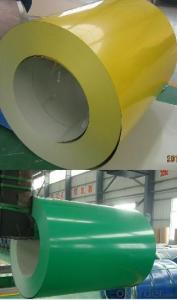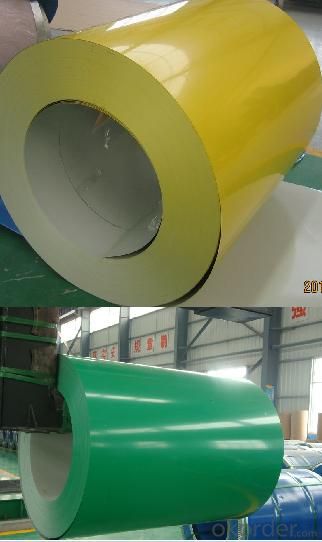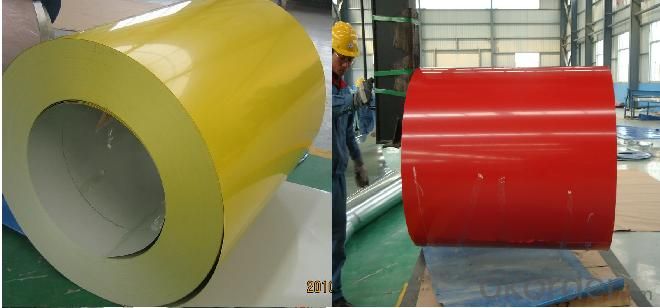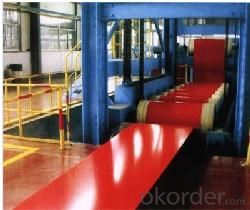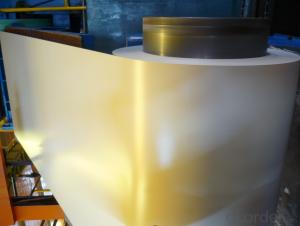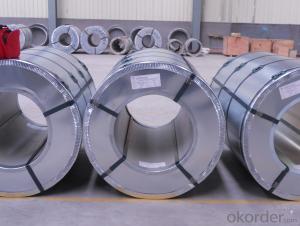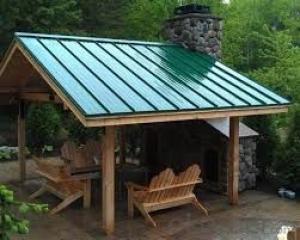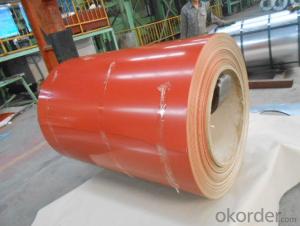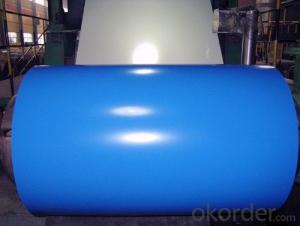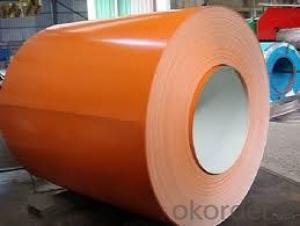Prepainted galvanized steel coils Prepainted steel coil
- Loading Port:
- Shanghai
- Payment Terms:
- TT OR LC
- Min Order Qty:
- 50 m.t.
- Supply Capability:
- 100000 m.t./month
OKorder Service Pledge
OKorder Financial Service
You Might Also Like
Quick Details
| Standard: | AISI,ASTM,DIN,JIS | Grade: | steel | Thickness: | 0.17-1.5mm |
| Place of Origin: | China (Mainland) | Brand Name: | CNBM | Model Number: | SGCC Q195L, Q235, DX51D |
| Type: | Steel Coil | Technique: | Hot Rolled,hot dip | Surface Treatment: | Coated |
| Application: | Flange Plate | Special Use: | Steel | Width: | 600-1250mm |
| Length: | 2000-6000mm |
Specifications
1.reasonable price
2.reliable quality
3.fast shipment
4.huge production capacity
5.BV,SGS and TUV certificates
Prepainted Steel coil PPGI
Our Advantages
1. more than 10 years experiences in steel business
2. good quality
3. competitive price
4. meet your needs via reprocessing
5. excellent service
6. short delivery time
7. long mutual beneficial business cooperation
8. certificate: ISO9001
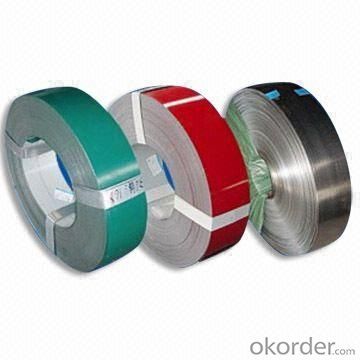
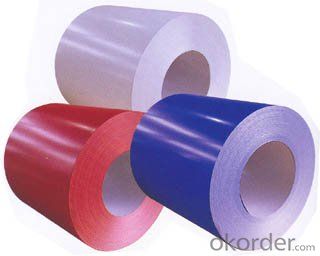
| Commodity | Prepanited steel coil |
| Grade | JIS G3302(SGCC), DX51D, EN10142, GB/T2518-2004, ASTM 653 |
| Standard | ASTM, AISI, DIN, GB |
| Types | Commercial / Drawing / Deep Drawing / Structural quality |
| Width | 500/650/726/820/914/1000/1200/1219/1220/1250mm |
| Thickness | 0.16-1.2mm (0.14-0.5mm is the most advantage thickness) |
| Type of coating | Galvanized |
| Zinc / PE coating | Z60-275g/m2 ,12-20μm(top)/7-10μm(bottom) |
| Surface | RAL System as per customers request |
| ID coil | 508mm |
| Coil weight | 4-6MT |
| Package | Properly packed for ocean freight exportation |
| Application | Industrial panels, roofing and siding for painting |
| Payment terms | 30%TT in advance+70% TT or irrevocable 100%L/C at sight |
| Delivery time | 25 days after recepit of 30% TT or L/C |
PACKING
4 eye bands and 4 circumferential bands in steel, galvanized metal fluted rings on inner and outer edges, galvanized metal & waterproof paper wall protection disk, galvanized metal & waterproof paper around circumference and bore protection
FAQ
We have organized several common questions for our clients,may help you sincerely:
1)How to guarantee the quality of the products?
We have established the international advanced quality management system,every link from raw material to final product we have strict quality test;We resolutely put an end to unqualified products flowing into the market. At the same time, we will provide necessary follow-up service assurance.
2)How long can we receive the product after purchase?
In the purchase of product within 20-25 days, we will arrange the factory delivery as soon as possible. The pacific time of receiving is related to the state and position of customers. Commonly 15 to 30 days can be served.
3)Do you have necessary certificate or inspection to make sure we can import smoothly?
Syringes are CE,FDA approved. And we supplied main nations in the world.
- Q: Are steel coils used in HVAC systems?
- Yes, steel coils are commonly used in HVAC systems. They are used in air conditioning units and heat pumps to transfer heat between the refrigerant and the surrounding air, thereby cooling or heating the space. Steel coils are efficient in heat exchange due to their high thermal conductivity and durability.
- Q: Having a greater amount than 2% carbon in steel causes steel to suddenly become brittle. Why is this?
- Carbon fiber has better tensile capability then steel meaning its better while pulled aside. Plus you could mould the fiber to make autos-or homes-out of carbon fiber.
- Q: What are the common quality control measures for steel coils?
- To ensure the performance and reliability of steel coils, several common quality control measures are implemented. These measures play a crucial role in upholding the overall quality of the coils and ensuring their compliance with the necessary standards and specifications. To begin with, dimensional checks are conducted to verify that the steel coils possess the correct thickness, width, and length. Deviations from the specified dimensions can significantly impact the coils' functionality and usability, making this check of utmost importance. Following that, visual inspections are carried out to identify any surface defects or imperfections such as scratches, dents, or corrosion. These inspections aid in identifying potential issues that could compromise the structural integrity of the coils or affect their aesthetic appearance. Moreover, mechanical property tests are performed to assess the strength, hardness, and other mechanical characteristics of the steel coils. These tests provide valuable insights into the coils' performance and durability under different conditions and loads. An essential quality control measure for steel coils is the analysis of their chemical composition. This involves scrutinizing the steel's composition, including the presence of any impurities or elements that may impact its properties. It ensures that the coils are made from the correct grade of steel and meet the required chemical specifications. Coating inspections also play a vital role in quality control. When steel coils are coated with protective layers, it is imperative to examine the adhesion, thickness, and uniformity of these coatings. This examination ensures that the coils have sufficient protection against corrosion and other environmental factors. Lastly, various non-destructive testing methods, such as ultrasonic testing, magnetic particle inspection, or eddy current testing, are employed to detect any internal defects or abnormalities in the steel coils. These tests enable the identification of issues like cracks, inclusions, or discontinuities that may not be visible through visual inspection alone. In conclusion, the quality control measures for steel coils consist of dimensional checks, visual inspections, mechanical property tests, chemical composition analysis, coating inspections, and non-destructive testing. These measures are vital in maintaining the quality and reliability of steel coils, guaranteeing their compliance with the required standards, and meeting customer expectations.
- Q: and which one is better?i'm looking into buying some aftermarket headers, but companies make them in both chrome and stainless steel
- Chrome looks better, but it will eventually rust if it's exposed to enough moisture. Stainless steel will not rust. I would spend the extra money and get the stainless headers.
- Q: What are the different methods of cutting edge trimming for steel coils?
- There exist multiple techniques for trimming steel coils, each with unique benefits and applications. Some of the frequently employed methods are as follows: 1. Shearing: This method entails cutting the steel coil's edge using sharp blades. It is a quick and efficient technique suitable for high-volume production. However, shearing may lead to slight distortion or burrs along the cut edge. 2. Slitting: Slitting involves passing the steel coil through rotating circular blades, resulting in narrower strips. This method is commonly adopted when precise width control is necessary, such as for the production of narrow strips or coils with multiple widths. 3. Laser cutting: Laser cutting is a highly precise technique that employs a laser beam to cut through the steel coil. It offers the advantage of producing clean and precise cuts without any distortion or burrs. Laser cutting is frequently used for intricate or complex shapes that require high accuracy. 4. Plasma cutting: Plasma cutting utilizes an ionized gas jet to cut through the steel coil. It is particularly suitable for thicker materials or applications where high cutting speeds are required. Plasma cutting can generate clean and smooth cuts, although a slight bevel may be present on the edge. 5. Waterjet cutting: Waterjet cutting employs a high-pressure jet of water mixed with an abrasive substance to cut through the steel coil. This technique is highly versatile and can be used for various materials and thicknesses. Waterjet cutting is renowned for producing precise cuts without any heat-affected zone. 6. Sawing: Sawing is a traditional method that involves using a rotating saw blade to cut through the steel coil. It is commonly used for thicker materials or when a rougher cut is acceptable. Sawing can be performed manually or with the assistance of automated sawing machines. Each method possesses its own advantages and considerations, and the selection depends on factors such as required accuracy, production volume, material thickness, and desired edge quality.
- Q: How are steel coils used in the production of pressure vessels?
- Steel coils are used in the production of pressure vessels as they provide a strong and durable material for constructing the vessel's shell. The coils are typically formed and welded to create the cylindrical shape of the vessel, ensuring it can withstand high pressure and contain fluids or gases safely.
- Q: How are steel coils used in the manufacturing of roofing materials?
- Steel coils are used in the manufacturing of roofing materials as they are rolled into sheets or formed into various shapes to create durable and long-lasting roofing products. The coils are processed through machines that cut, bend, and shape them into the desired dimensions and profiles required for different types of roofs.
- Q: How do steel coils impact the overall cost of production?
- Steel coils can have a significant impact on the overall cost of production. The cost of steel coils is a major component in the production process, as they are used as raw materials in various industries such as automotive, construction, and manufacturing. Fluctuations in the price of steel coils can directly affect the cost of production, ultimately influencing the final price of the end product. Additionally, factors such as transportation and storage costs also contribute to the overall impact of steel coils on production costs.
- Q: How are steel coils inspected for flatness using optical sensors?
- Steel coils are inspected for flatness using optical sensors by measuring the surface profile of the coil. These sensors use laser or camera technology to scan the coil's surface and detect any deviations from a perfectly flat shape. The collected data is then analyzed to identify any areas that do not meet the required flatness criteria, allowing for necessary adjustments to be made before the steel coils are further processed or shipped.
- Q: What are the factors that affect the quality of steel coils?
- The quality of steel coils can be influenced by various factors. To begin with, the composition of the steel itself plays a vital role in determining its quality. Impurities like sulfur or phosphorus can have a negative impact on the strength, durability, and overall performance of the steel. Additionally, the quality of the steel is affected by its carbon content, alloying elements, and heat treatment. Furthermore, the quality of the steel coils is greatly affected by the manufacturing process and techniques utilized during production. Factors such as the cleanliness of the production environment, the precision of the rolling and cooling processes, and the control of temperature and pressure throughout manufacturing all contribute to the final quality of the coils. Additionally, the surface quality of the steel coils is a crucial factor. Any defects or imperfections on the surface, such as scratches, dents, or corrosion, can compromise the integrity and functionality of the coils. It is essential to handle, store, and transport the coils properly to maintain their surface quality. Moreover, the mechanical properties of the steel coils, including tensile strength, yield strength, and elongation, are essential indicators of their quality. These properties depend on various factors, such as the type of steel, its thickness, and the processing conditions. Lastly, external factors such as environmental conditions, like humidity and temperature, can affect the quality of steel coils. Exposure to moisture or extreme temperatures can lead to corrosion or other forms of degradation, impacting the overall quality and lifespan of the coils. In conclusion, the quality of steel coils is influenced by several factors, encompassing the composition of the steel, the manufacturing process, surface quality, mechanical properties, and external environmental conditions. It is crucial to carefully control and monitor these factors to produce high-quality steel coils that meet the desired specifications and standards.
Send your message to us
Prepainted galvanized steel coils Prepainted steel coil
- Loading Port:
- Shanghai
- Payment Terms:
- TT OR LC
- Min Order Qty:
- 50 m.t.
- Supply Capability:
- 100000 m.t./month
OKorder Service Pledge
OKorder Financial Service
Similar products
Hot products
Hot Searches
Related keywords
